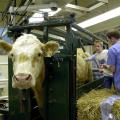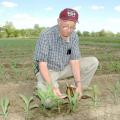Feature Story from 2006
MISSISSIPPI STATE -- A May 11 forage field day in Holly Springs will display cutting- edge grazing and forage research and present information on the management of one Mississippi State University cow herd.
The North Mississippi Forage Field Day is being held at the Mississippi Agricultural and Forestry Experiment Station’s Holly Springs Branch Experiment Station. Highlights of the one-day event will be information on chicory grazing research, Brown Midrib Sudangrass and beef herd management.
MISSISSIPPI STATE -- New regulations that govern lime sales make it easier for producers to decide how best to meet their soils' nutrient needs.
Larry Oldham, soil specialist with the Mississippi State University Extension Service, said Mississippi's lime law was established in 1993. In 1997, the regulations were amended to create a grading system, but these regulations were revised recently with input from the Extension Service, the Mississippi Agricultural and Forestry Experiment Station and other stakeholders. The new law went into effect Dec. 15.
MISSISSIPPI STATE -- The evolving global energy market and the challenges and opportunities it presents agriculture will be the topics of the Mississippi Agricultural Economics Association annual symposium in Starkville.
The symposium will be held June 22 and 23 at Mississippi State University in the Forest Products Auditorium. The public and those representing the ag industry, business and finance are invited to attend. A $20 symposium fee covers the Friday meeting and lunch.
By Emily Cole
MISSISSIPPI STATE -- Ten-year-old steers are very uncommon since most go to market by the age of 2, but Peaches is living out his life at Mississippi State University with something that makes him even more rare. He has a six-inch hole in his side.
MISSISSIPPI STATE -- Springtime brings new battles with fire ants to gardeners and homeowners, and choosing the right tool to fight them is a key to winning against these pests.
Blake Layton, entomologist with the Mississippi State University Extension Service, said treating fire ants on a mound-by-mound basis does not work.
“For every large mound you see, there are many smaller ones that you can't see,” Layton said. “Killing only the large mounds removes the competition and allows the smaller ones to grow faster.”
MISSISSIPPI STATE -- Energy and fertilizer prices appear to be driving farmers significantly away from crops that require more inputs in favor of crops that need less.
The U.S. Department of Agriculture released its annual prospective plantings report March 31, and Mississippi producers are predicted to decrease rice plantings by 21 percent and corn acreage by 13 percent.
MISSISSIPPI STATE -- Sweet potatoes are great baked or in pies, but fans will soon have a new way to enjoy them, especially during the summer months.
The Mississippi State University Dairy Processing Plant is adding sweet potato to its list of ice cream flavors. MSU's history with ice cream production goes back to the 1940s, and the campus currently churns out 15 flavors. Most are the standards, including chocolate, vanilla and strawberry, but sweet potato will join muscadine ripple as the second flavor unique to MSU.
MISSISSIPPI STATE -- Mississippi’s 4-H program was among the 4-H groups recently recognized by the Department of Defense for “exceptional service” to children, youth and families of military personnel around the world.
Secretary of Defense Donald Rumsfeld signed a certificate of commendation to the national 4-H Youth Development Program and a framed copy was delivered to Martha Ray Sartor, 4-H specialist with Mississippi State University’s Extension Service. Sartor oversees Mississippi’s 4-H Military Project.
MISSISSIPPI STATE -- If it looks like a basketball is stuck in a tree or bush this April, better check closely before knocking it out -- it may be a swarm of thousands of honey bees.
Honey bees start to swarm in mid-March in South Mississippi, and by the end of April they are swarming in the northern part of the state. Doug Stone, a beekeeper and Mississippi State University research associate in forest entomology in the Department of Entomology and Plant Pathology, said bees swarm just before the nectar starts to flow in plants.
MISSISSIPPI STATE -- Mississippi's dairy farms continue their downward spiral with no relief in sight as a result of low milk prices, high fuel costs and damage from Hurricane Katrina.
Bill Herndon, agricultural economist with the Mississippi State University Extension Service, said the state had 235 dairy farms in August before Hurricane Katrina. On April 1, Mississippi was down to 198.
MISSISSIPPI STATE -- Mississippi farmers are expected to plant the same number of acres as they did in 2000, but the outcome should be drastically different.
The year 2000 was the last time the state's farmers planted as much as 1.7 million acres of soybeans. That year, the average yield was 22 bushels. In the last three years, growers have averaged 37 to 39 bushels per acre.
MISSISSIPPI STATE -- Agricenters and horse facilities are attracting barrel racers and spectators to Mississippi by the thousands each year, and the numbers are growing.
When Bricklee Miller, manager of the Mississippi Horse Park, says “the numbers are growing,” she is talking about several important figures.
“The number of events, the number of participants and spectators, the prize money, the economic impact -- all of these numbers are growing,” Miller said.
MISSISSIPPI STATE -- Financial management instruction is close at hand for Mississippians filing for bankruptcy.
Bobbie Shaffett, a specialist with Mississippi State University’s Extension Service, said Extension family resource and management area agents have been approved by the U.S. Department of Justice to provide instruction in person to bankruptcy filers.
MISSISSIPPI STATE -- A generous donation has helped advance the Mississippi State University College of Veterinary Medicine’s ability to diagnose cases and reduce hospital stays.
The veterinary college recently dedicated the Mimi and Russell Gaines Imaging and Diagnostic Unit. The room will house a CT scanner for the college's Animal Health Center. A gift from Russell Gaines outfitted the room in memory of his late wife Mimi, a Starkville radiologist and an MSU alumna.
MISSISSIPPI STATE -- Mississippi's agricultural industry is poised to minimize the second year of soybean rust after the disease overwintered in Florida and northeast Mexico.
“As of late April, we haven't seen any rust in the state this year,” said Alan Blaine, soybean specialist with the Mississippi State University Extension Service. “Winter weather beat it back to where it overwintered in south Florida.”
MISSISSIPPI STATE -- Conditions have been favorable to produce a large crop of big shrimp, but with record-high fuel prices and uncharted debris in the shrimping grounds, it may be a struggle to land this crop.
The coast is about 14 inches behind normal rainfall for the year, and this drought means salt content is higher in the bayous and inland waterways where young shrimp mature. The young shrimp are growing well in these favorable conditions, and adult shrimp not caught last year because of the hurricane's disruption are even bigger this year.
MISSISSIPPI STATE -- A colorful, interactive human body exhibit is part of an effort to change nutrition and health decisions Mississippi's children are making.
Body Walk is a fun-filled exhibit of the human body with nine interactive learning stations. Each station teaches children to make healthy choices for their mind and body. The free exhibit has been seen by thousands of school children across the state in its first semester of use.
MISSISSIPPI STATE -- Dogs, cats and sometimes people are targets of fleas and ticks as warm weather brings out these annoying parasites.
Dr. Stanley Robertson, Extension veterinarian at Mississippi State University's College of Veterinary Medicine, said fleas and ticks are a problem from spring to early fall in Mississippi.
“These are external parasites that use animals and humans for a blood meal,” Robertson said. “Ticks and fleas can transmit diseases and animals, especially dogs, can become allergic to a protein in the flea's saliva.”
MISSISSIPPI STATE -- Many people work hard to keep weeds out of their yards, but other troubling pests, such as moles and voles, need aggressive treatment as well.
Moles are small, furry creatures with beak-like noses, tiny weak eyes, no visible ears, paddle-like front feet with large claws and stubby, hairless tails. Moles are not likely to be seen, but they leave behind unmistakable evidence.
By Linda Breazeale
MISSISSIPPI STATE -- Warm spring temperatures have pushed corn quickly through its most vulnerable stages and given fields the potential for a good year.
Pages
Feature Story Archive
- 2025 (64)
- 2024 (116)
- 2023 (114)
- 2022 (112)
- 2021 (104)
- 2020 (140)
- 2019 (126)
- 2018 (141)
- 2017 (197)
- 2016 (240)
- 2015 (319)
- 2014 (355)
- 2013 (371)
- 2012 (343)
- 2011 (246)
- 2010 (236)
- 2009 (229)
- 2008 (188)
- 2007 (210)
- 2006 (199)
- 2005 (224)
- 2004 (215)
- 2003 (228)
- 2002 (176)
- 2001 (184)
- 2000 (188)
- 1999 (180)
- 1998 (178)
- 1997 (188)
- 1996 (58)
- 1995 (36)





